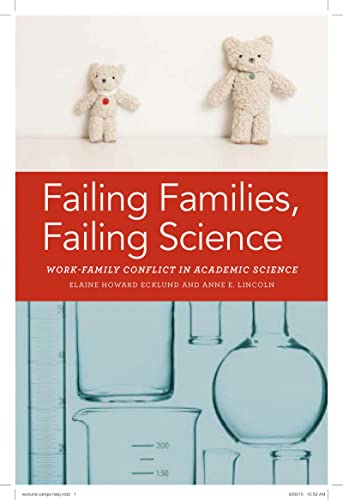Failing Families, Failing Science
Work-Family Conflict in Academic Science
Elaine Ecklund; Anne E. Lincoln
BOOK REVIEW

In the fast-paced realm of academia, where groundbreaking discoveries are celebrated and relentless competition reigns supreme, the tug-of-war between family obligations and scientific demands casts a long shadow. Failing Families, Failing Science: Work-Family Conflict in Academic Science by Elaine Ecklund and Anne E. Lincoln unravels this complex dilemma with a deftness that not only illuminates a pressing issue but also sparks a much-needed conversation about the fabric of our academic institutions.
From the outset, this potent work captures your attention by delving into the heart of work-family conflict-a struggle that reverberates through the halls of universities and impacts countless lives. Through rigorous research and eye-opening interviews, Ecklund and Lincoln bring to light the stories of academics grappling with the impossible task of balancing their professional ambitions with family commitments. The struggles faced by parents in academia are not just anecdotal; they are symptoms of a systemic issue that leaves many feeling isolated and unsupported.
This book is not merely an indictment of the academic system; it's a call to arms. The authors present stark realities, exposing an academic culture that often fails to accommodate those who dare to juggle multiple roles. The statistics presented will stun you. The percentage of women in academia continues to dwindle at higher levels, a phenomenon tied closely to the challenges of maintaining family life amidst rigorous career expectations. It's a heartbreaking reflection of a society that still grapples with gender bias and structural inequities, where stepping back to raise a family often means stepping away from one's career-an unthinkable trade-off for many.
Ecklund and Lincoln seek to unpack the ways these conflicts manifest, from the sleepless nights spent on research, to the tension-laden conferences that can make or break careers. They detail the unsaid burdens carried by those within the academic community-mothers and fathers alike-who find themselves on a precarious tightrope. The tension is palpable. As you read through their findings, you cannot help but feel a simmering anger towards an academic structure that devalues family life in favor of unyielding productivity.
But hold onto that frustration, because the authors provide not just a problem but potential solutions. They advocate for a cultural shift within academia, proposing policies that radically rethink how we define academic success. Imagine workplaces where parental leave is not just an afterthought, where flexible schedules are the norm, and where the conversations around work-family balance are woven into the fabric of academic life. The authors don't just throw data at you; they invite you to envision a more equitable future-one where families do not have to suffer for scientific advancement.
It's crucial to acknowledge the backlash echoed in the reviews of this work. Some critics argue that the authors' focus on the challenges faced by academic families may inadvertently gloss over the achievements and resilience found within these same families. They question whether the book's portrayal could deepen the stigma attached to those who choose to prioritize family life over career advancement. However, Ecklund and Lincoln deftly counter these criticisms by emphasizing that their work is not about diminishing academic achievement but about advocating for systems that uphold both family and career. They challenge the notion that pursuing family life equates to failure, positioning it instead as a legitimate and essential part of one's academic journey.
Readers have felt this book reach into their hearts, sparking conversations that resonate beyond the pages. It's a manifesto for change written in empathetic prose, blending research with narrative in a way that feels both personal and universal. Those who have ventured into Failing Families, Failing Science often find themselves compelled to reflect and, even more importantly, to take action. This is not a typical academic text; it's a lifeline for those feeling beleaguered by the demands of dual roles and a roadmap to progress that's as urgent as it is necessary.
As you consider the ramifications of this work, you may feel an overwhelming urge to engage with its findings. This isn't just literature; it's a social critique that resonates deeply in today's society, where traditional structures are constantly challenged and redefined. The echoes of Ecklund and Lincoln's arguments can be felt in boardrooms, classrooms, and family gatherings.
Ultimately, the call to action in Failing Families, Failing Science extends beyond academia and into our everyday lives. The urgency to support families in a demanding world is a message we all need to hear. In the flickering candlelight of our academic endeavors, let's not forget the warmth of home. 🙌
📖 Failing Families, Failing Science: Work-Family Conflict in Academic Science
✍ by Elaine Ecklund; Anne E. Lincoln
🧾 203 pages
2016
#failing #families #failing #science #work #family #conflict #academic #science #elaine #ecklund #ElaineEcklund #anne #lincoln #AnneELincoln